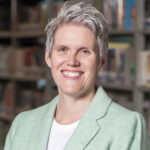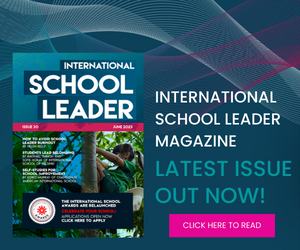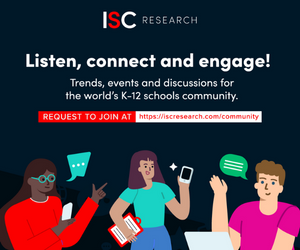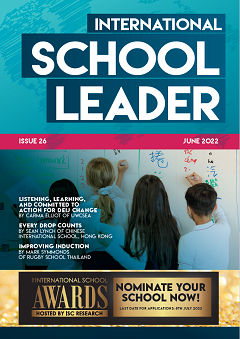By Ildiko Murray
Are you in a constant loop of self-study preparation? Is your staff burnt out by the requirements of the different accrediting bodies? In this article, Ildiko Murray, Head of School at Changchun American International School, China, explores how to collect, organise, present and use the materials for accreditation that go beyond checking boxes and aid continuous school improvement.
Schools seeking accreditation by the International Baccalaureate (IB), the Western Association of Schools and Colleges (WASC) and the Council of International Schools (CIS), just to mention a few organisations, need to complete self-study questionnaires as the first step of the programme evaluation process. Internal evaluators, who are teachers or administrators at the school, are responsible for engaging all stakeholders to participate in the preparation of the self-study that is subsequently submitted to the appropriate regional offices for external review. Evaluation visits usually follow this submission to verify the self-studies and determine the accreditation or reaccreditation of a school’s programme (International Baccalaureate, 2010). Teachers and administrators are, therefore, important participants in the accreditation process and they collaborate with all stakeholders including parents, school boards, and national and international accreditation bodies to secure appropriate approval for the programmes they are delivering. There are several pros and cons of self-assessment as part of the evaluation process:
Pros:
- Ownership of evaluation – the Socratic notion of knowing thyself
- According to MacBeath and McGlynn, “Those who are closest to everyday practice are also those best placed to evaluate and improve it… [The] primary aim [of the self-study] is to establish a climate, or culture, in which there is a shared belief that everyone can make a difference and that school improvement is the right and responsibility of every single member of the educational community.”
Cons:
- Self-deluding
- Risk of ‘dramaturgical compliance’ – what Kemenade and Hardjono describe as window dressing that strongly jeopardises the legitimacy of the evaluation/accreditation process.
- Perception of evaluation as ‘words on paper’ or just pretending
Ultimately, the accreditation journey can serve as a powerful vehicle for school improvement if handled correctly.
“Teachers, students and parents need to see themselves as a crucial part of systematic, institutional change and growth.”
The 3 Ps: process, progress and pushback
As we were preparing the self-study documents for our CIS/WASC accreditation during severe lockdown conditions in the spring of 2022 at my school, our leadership team had to work hard to keep our staff motivated. Firstly, we focused on making the process of collecting evidence and writing the self-study as user-friendly as possible. Secondly, we wanted to use the materials collected for many different purposes so our staff could see many benefits for this work. Finally, we prepared for the inevitable negative aspects of the self-study process.
Process
As part of the initial preparation of the self-study, several members of our team completed CIS and WASC training and became school visit team members. This provided us with first-hand experiences of the self-study and how other schools approached the process.
We developed a timeline using the backwards design process starting with the due dates for the self-study and taking into consideration important dates and events at our school. All administrators, teachers, students and parents (stakeholders) must be involved in the evaluation. So, we divided up responsibilities based on interest and abilities and set meeting times strategically. We set realistic due dates for the completion of sections and were flexible with the types of input from different stakeholders.
We used the special circumstances of the lockdown to our advantage as much as possible. During the lockdown, we could not run extracurricular activities (ECA). We used the ECA time to work on the self-study. We had to meet online, so we used Padlet to collaborate on the self-study and share documents and evidence. We used an approach of ‘show me, don’t just tell me about the practice’ for the Padlets so our evidence became rich with pictures, videos and student work. This is an example of turning our devastating circumstances into an asset. We stayed realistic and aimed for a ‘good enough’ but not perfect self-study.
Progress
Our school became an academically more rigorous and safer place for our students and staff because of our accreditation process. Our stakeholders are more aware of our programmes and our students are served better. Moreover, the evidence that we collected became part of the training programme for our new teachers and the backbone for our marketing for new students and parents. Our staff can see their work used daily.
Pushback
Leaders need to acknowledge that change is hard and systematic change takes time. Sensitivity is needed when we are engaged in evaluation. Internal evaluators need to be prepared for less than enthusiastic responses from stakeholders. Regardless of the best efforts of the accreditation team, not all staff members will see the value in the evaluation process. On a survey regarding the evaluation process, one anonymous teacher wrote, “I honestly and truly feel that most paperwork is simply a timewaster. The sheer volume of this means that most of it will only be occasionally referenced, so I wonder about its usefulness-to-time-spent ratio”. How do we stop the evaluation from becoming just ‘dramaturgical compliance’?
Now what?
It is important that stakeholders view accreditation as a transformative process. Teachers, students and parents are not asked to put on a show for visitors, rather they need to see themselves as a crucial part of systematic, institutional change and growth. The self-studies will remain words on paper if they do not provoke thoughtful action on our part. Leaders need to ensure that the evaluation is not just a requirement that our school completes but that it is a service to our students.
20 tips and tricks to self-study
- Include the resistors; they often have the best ideas and learn the most.
- Include the power sources such as influential staff or parents, administrators and board members.
- Clarify roles and how decisions will be made. Know who will do what to whom and how.
- Be realistic about time, both how much the self-study will take and how much you have to give.
- Take advantage of unexpected ‘gifts’ of time.
- Aim for ‘good enough’.
- Remember that all data is personal, and it can cause discomfort when it is about you or someone else in the room or someone else not in the room.
- All ideas are draft: suggestions are more readily accepted than commands.
- Feed your evaluation teams.
- Stick to the facts: avoid trying to ‘fake’ what your school is doing in writing.
- Change culture by changing daily practice.
- Look forward to the evaluation as a learning experience and a look back to see where you have been.
- Remember ‘balance’: look for the positive not just the areas that need strengthening.
- If you don’t know, find someone who does and ask.
- Celebrate your achievements and brag when appropriate.
- Use the material that you collected for evidence to orient and train your new teachers and to market your school and programmes. Staff will be more motivated to contribute to the self-study if they see their hard work utilised in multiple ways even after the accreditation visit is completed.
- There is no need to reinvent the wheel: reuse materials from one accreditation or evaluation for another. Try to synchronise the different self-studies if possible.
- Use your networks: reach out to other administrators and organisations to get to know a wide variety of approaches to the self-study process and share your own experiences in return.
- Participate in the specific training provided by the accrediting body for the self-study process.
- Become a visiting team member. This is the best way to become knowledgeable about the specific processes for the different accrediting bodies.

Ildiko Murray, PhD is Head of School at Changchun American International School in China. Connect directly with her on LinkedIn or email [email protected]



